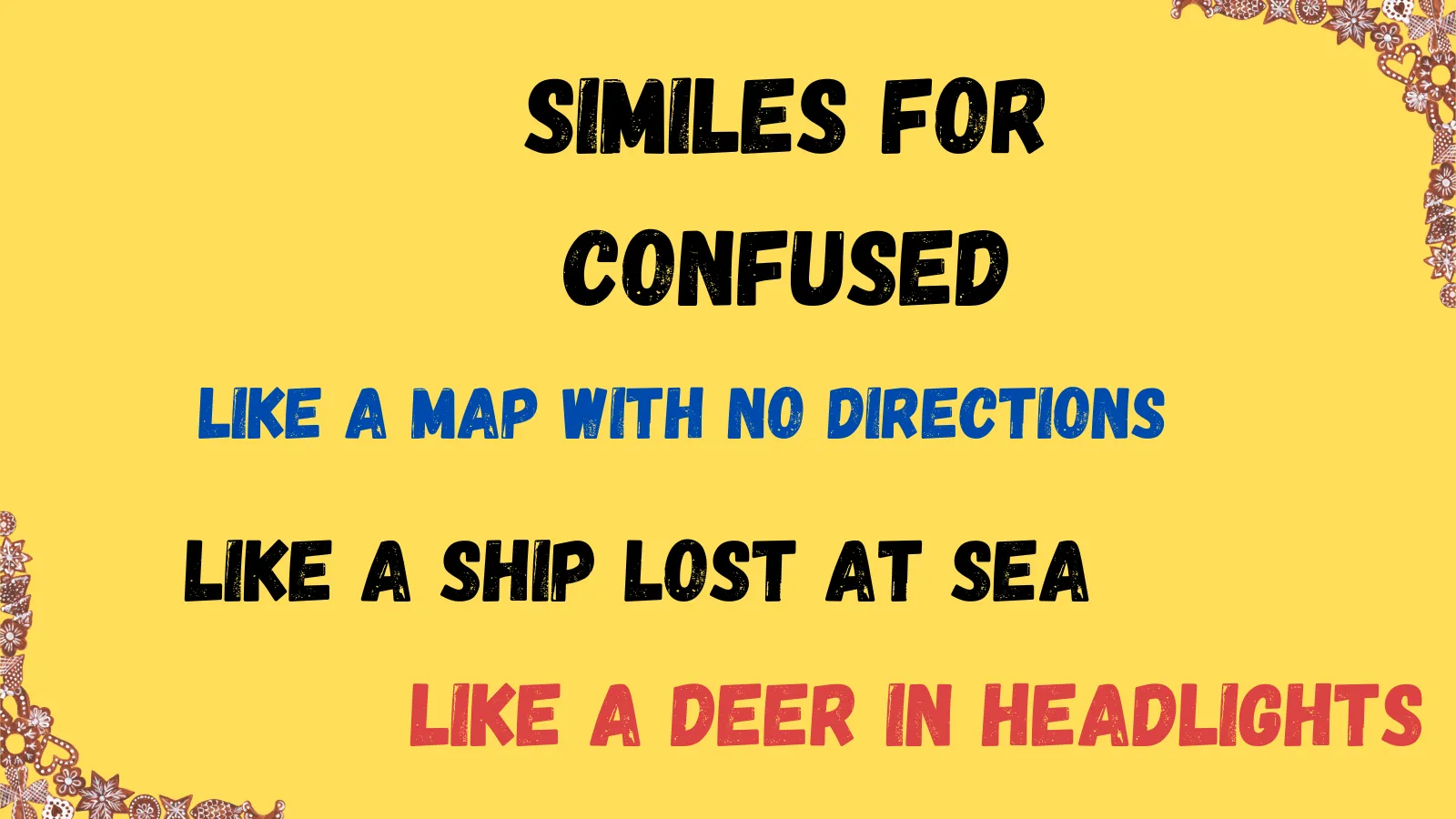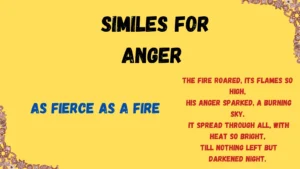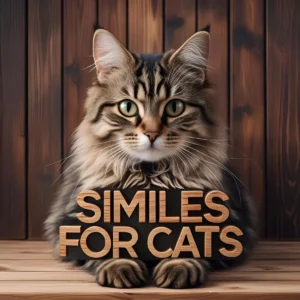Ever felt “as lost as a traveler in an unfamiliar city” or “like a stunned deer caught in bright lights”?
Similes for confused help describe moments of uncertainty, puzzlement, and embarrassment in a clear and vivid way.
If you’re writing about a confused character, a tricky situation, or a moment of doubt, the right simile makes your description more engaging.
A simile links two things with “like” or “as,” painting a vivid and clear picture. In this guide, you’ll find the best similes for confusion to make your writing clearer and more expressive!
Similes for Confused Examples in Prose and Poetry
1. Like a deer in headlights
- Meaning: Feeling frozen or paralyzed due to confusion or fear.
- Formal: The new employee looked like a deer in headlights during the meeting, unsure how to respond to the question.
- Casual: When she was asked about the surprise party, she looked like a deer in headlights, totally confused.
- Example in Poetry:
Caught in the glare of an unknown light,
The deer stands still, lost in the night.
2. Like a puzzle with missing pieces
- Meaning: A situation where things don’t make sense because key details are missing or unclear.
- Formal: The strategy appeared like a puzzle with missing pieces, leaving the team uncertain about the next steps.
- Casual: Trying to understand his explanation was like trying to solve a puzzle with missing pieces.
- Example in Poetry:
I search for pieces, one by one,
Yet many are gone, the puzzle undone.
3. Like a chicken with its head cut off
- Meaning: Acting frantically without direction or understanding.
- Formal: She ran through the office like a chicken with its head cut off, trying to finish every task at once.
- Casual: When I couldn’t find my keys, I felt like a chicken with its head cut off, running around the house.
- Example in Poetry:
Swift, unsteady steps on a barren floor,
A headless bird, lost, no path to explore.
4. Like a ship lost at sea
- Meaning: Feeling completely directionless and uncertain about what to do next.
- Formal: The company seemed like a ship lost at sea during the transition period, uncertain of how to move forward.
- Casual: I felt like a ship lost at sea when they started talking about the new project.
- Example in Poetry:
Out on the vast, uncharted wave,
A ship drifts, with no course to save.
5. Like a coin tossed in the air
- Meaning: Feeling as though the outcome is uncertain and unpredictable.
- Formal: The decision seemed like a coin tossed in the air, with no clear path to choose.
- Casual: I felt like a coin tossed in the air when I had to choose between the two job offers.
- Example in Poetry:
A flicker of light, a spin in the air,
The coin dances with no answer to share.
6. Like a tangled ball of yarn
- Meaning: A situation or mind that is complicated and hard to untangle.
- Formal: His thoughts were like a tangled ball of yarn, difficult to organize in the face of the problem.
- Casual: When they asked me that question, my thoughts became like a tangled ball of yarn.
- Example in Poetry:
Threads twisted, knotted in my mind,
A mess I can’t seem to unwind.
7. Like a map with no directions
- Meaning: Feeling lost without clear guidance or instructions.
- Formal: She was like a map with no directions, unable to decide on the next course of action.
- Casual: Trying to figure out the game rules felt like using a map with no directions.
- Example in Poetry:
A map unfurled, no roads to show,
Lost in the fog, where do I go?
8. Like a rabbit caught in a trap
- Meaning: Feeling trapped or stuck, not knowing how to escape the confusion.
- Formal: The defendant appeared like a rabbit caught in a trap, unable to answer the lawyer’s question.
- Casual: I felt like a rabbit caught in a trap when they kept asking me about my plans.
- Example in Poetry:
Caught in the snare, trembling in fear,
A rabbit’s heart beats, but the way is unclear.
9. Like a clock with no hands
- Meaning: A sense of being unable to measure or understand time or direction.
- Formal: His speech was like a clock with no hands, lacking structure or a clear timeline.
- Casual: I was like a clock with no hands during the meeting, not knowing what was happening next.
- Example in Poetry:
The ticking stills, no hands to find,
Lost in time, I fall behind.
10. Like a kite without a string
- Meaning: Feeling aimless, without control or direction.
- Formal: The committee was like a kite without a string, unable to decide on a unified vision.
- Casual: Without a plan, we were like kites without strings, drifting aimlessly.
- Example in Poetry:
The winds take me high, the sky is wide,
But with no string, I drift and glide.
11. Like a computer with no software
- Meaning: A person or situation that is missing essential components needed to function.
- Formal: The meeting was like a computer with no software—information was presented, but there was no real system or order.
- Casual: I felt like a computer with no software when I walked into the class and had no idea what was going on.
- Example in Poetry:
A screen flickers, blank and still,
No program runs, no thoughts to fill.
12. Like a blindfolded person at a maze
- Meaning: Feeling completely lost or unaware, unable to find a way forward.
- Formal: The company’s strategy was like a blindfolded person at a maze, uncertain of how to proceed.
- Casual: Trying to follow the directions felt like being blindfolded in a maze.
- Example in Poetry:
Blindfolded hands stretch, searching deep,
The maze confounds, and shadows creep.
13. Like a spider’s web in the wind
- Meaning: A situation that is fragile and easily disrupted due to confusion or complexity.
- Formal: The project’s timeline was like a spider’s web in the wind, at risk of collapsing due to unforeseen complications.
- Casual: Trying to figure out my schedule was like a spider’s web in the wind—everything kept changing!
- Example in Poetry:
Caught in the breeze, the web sways wide,
A fragile path, with nowhere to hide.
14. Like a foggy mirror
- Meaning: A state of mind where things are unclear and hard to see.
- Formal: The explanation left the entire audience like a foggy mirror, unable to grasp the full picture.
- Casual: His directions were like a foggy mirror, I couldn’t see anything clearly.
- Example in Poetry:
Steam rises, blurring the glass,
What once was clear, now fades and passes.
15. Like a leaf caught in a whirlwind
- Meaning: Feeling tossed around by events beyond one’s control, unable to find solid ground.
- Formal: The debate had left the senator like a leaf caught in a whirlwind, overwhelmed by competing arguments.
- Casual: I felt like a leaf caught in a whirlwind when they started asking me questions all at once.
- Example in Poetry:
Twirling fast, tossed by the breeze,
A leaf spins wild, with no time to freeze.
16. Like a shadow in the dark
- Meaning: A sense of confusion or uncertainty, as if one is just a vague presence.
- Formal: The details of the proposal were like a shadow in the dark, unclear and difficult to discern.
- Casual: I felt like a shadow in the dark when I walked into the meeting and didn’t know what was going on.
- Example in Poetry:
In the depths, I fade and fall,
A shadow cast upon the wall.
17. Like a confused jigsaw puzzle
- Meaning: When things don’t seem to fit together, leading to confusion.
- Formal: His explanation was like a confused jigsaw puzzle, with ideas that didn’t seem to connect.
- Casual: Trying to put everything together felt like trying to solve a jigsaw puzzle with pieces that didn’t fit.
- Example in Poetry:
Pieces scattered, scattered wide,
Each thought, a piece that cannot collide.
18. Like a lost tourist in a new city
- Meaning: Feeling out of place or unsure of one’s surroundings due to confusion.
- Formal: The speaker seemed like a lost tourist in a new city, unable to navigate the complexities of the situation.
- Casual: I felt like a lost tourist in a new city when I walked into the party, not knowing anyone.
- Example in Poetry:
Wandering streets, unsure and slow,
A foreign path, where do I go?
19. Like a cat in a room full of rocking chairs
- Meaning: Feeling nervous and unsure, as though danger or confusion is all around.
- Formal: The situation was like a cat in a room full of rocking chairs, delicate and full of potential for disaster.
- Casual: I felt like a cat in a room full of rocking chairs during that conversation—everything seemed off!
- Example in Poetry:
Paws tremble, the room does sway,
Every step unsure, in fear’s play.
20. Like a computer with no connection
- Meaning: Feeling disconnected and unable to engage with the situation.
- Formal: His thoughts were like a computer with no connection, unable to synchronize with the task at hand.
- Casual: My mind went blank, like a computer with no connection, when they asked me that question.
- Example in Poetry:
No signals, no wires to find,
Lost in a world, disconnected, confined.
21. Like a car stuck in traffic
- Meaning: A feeling of being stalled or unable to move forward due to confusion or indecision.
- Formal: The negotiation process felt like a car stuck in traffic, with no progress being made.
- Casual: Trying to get a decision out of them was like being in a car stuck in traffic—nowhere to go.
- Example in Poetry:
Engines hum but don’t proceed,
The road ahead is all I need.
22. Like a clock that runs backward
- Meaning: Things feeling out of place or time not making sense.
- Formal: The sequence of events was like a clock that runs backward, creating confusion about the project’s timeline.
- Casual: My brain felt like a clock that runs backward trying to understand the rules of that game.
- Example in Poetry:
Time rewinds in strange defeat,
The clock’s hands turn, but cannot meet.
23. Like a map with roads that lead nowhere
- Meaning: Feeling as though all options are pointless or will lead to confusion.
- Formal: The strategy seemed like a map with roads that lead nowhere, offering no real solutions.
- Casual: My plans were like a map with roads that lead nowhere, nothing made sense.
- Example in Poetry:
A roadless map, paths disappear,
My journey’s lost, and I still fear.
24. Like a forest with no clear path
- Meaning: Feeling lost or uncertain about the way forward.
- Formal: The new policy felt like a forest with no clear path, offering no easy solution to the problem.
- Casual: Trying to make sense of all the new information felt like walking through a forest with no clear path.
- Example in Poetry:
The trees rise tall, with no way known,
Each step I take, I’m more alone.
25. Like a magician’s trick gone wrong
- Meaning: A situation where expectations are shattered and confusion reigns.
- Formal: The performance felt like a magician’s trick gone wrong, leaving the audience more bewildered than amazed.
- Casual: The surprise announcement felt like a magician’s trick gone wrong—nothing made sense!
- Example in Poetry:
A trick not done, the illusion fades,
What was once magic, now a parade.
FAQs
1. What are similes for confused?
Similes for confusion are comparisons that describe feelings of uncertainty, puzzlement, or disorientation using “like” or “as”. For example, “as lost as a tourist without a map” or “like a deer in headlights.”
2. How do similes help describe confusion?
Similes create vivid mental images, making it easier for readers to understand and relate to the feeling of confusion. They enhance storytelling and make descriptions more engaging.
3. Can similes for confusion be used in daily conversations?
Yes! Phrases like “I felt as confused as a cat in a maze” can make everyday conversations more expressive and relatable.
4. What are some common similes for confusion?
Examples include “as mixed up as a jigsaw puzzle” and “like a computer with too many tabs open.”
5. How can I use similes for confusion in writing?
Use them in storytelling, essays, or dialogues to depict a character’s uncertainty. They add depth and emotion to descriptions.
Conclusion
Using similes for confused helps bring uncertainty, puzzlement, and disorientation to life in your writing.
If you describe someone feeling “as lost as a tourist without a map” or “like a computer with too many tabs open,” the right comparison makes your descriptions more engaging and relatable.
Incorporate these similes into your storytelling, essays, or everyday conversations to make confusion clearer and more expressive!



